When consumers spend their hard-earned dollars, do they really buy into images of sweaty yet existentially handsome Matthew McConaughey trail-running through a primordial forest before jumping into his Lincoln Navigator—or do they do research and buy the best car? Do fashionistas really believe a little Kar-Jen magic will rub off on them if they buy a box of Kylie’s new eye shadows—to the tune of a billion-dollar beauty empire?
Celebrities and commerce have been bosom buddies for as long as there have been famous people and products.But why? Why listen to Jennifer Aniston when she hawks Smart Water and Aveeno?
Researchers say the celebrity effect in marketing largely is a matter of perceived trust. A 2011 Taiwanese study concluded celebrity endorsements add perceived value, help consumers differentiate a product, and create a rapid bond with potential customers because of their familiarity with the celebrity—and this can trigger purchase intent in highly competitive markets with lots of products.
In fact, some experts say we are hardwired to recognize friendly faces we can trust. Among the first things newborns respond to is their mother’s face, for instance. That’s a survival instinct, carried over from when an encounter with an unrecognized face on an unfriendly human could be fatal.
A trigger so ingrained in human behavior sounds like a surefire marketing tactic, and brands agree. In the internet age, celebrity endorsements have skyrocketed both in numbers of partnerships and the amount celebs are paid to promote on any of a dozen different media platforms, including their own social media streams. Especially in the United States, where trendsetters and thought leaders for every community and sub-culture are churned out almost seasonally, celebrity branding is an industry unto itself.
In an emergent industry like cannabis—which remains quasi-legal and stigmatized and endures significant advertising restrictions—are celebrity endorsements and product partnerships worth their weight in gold?
“Cannabis consumers, like all consumers, are drawn to what they’re familiar with—names and brands and flavors and methods they’ve enjoyed before,” said Ricardo Baca, founder of cannabis public relations agency Grasslands.
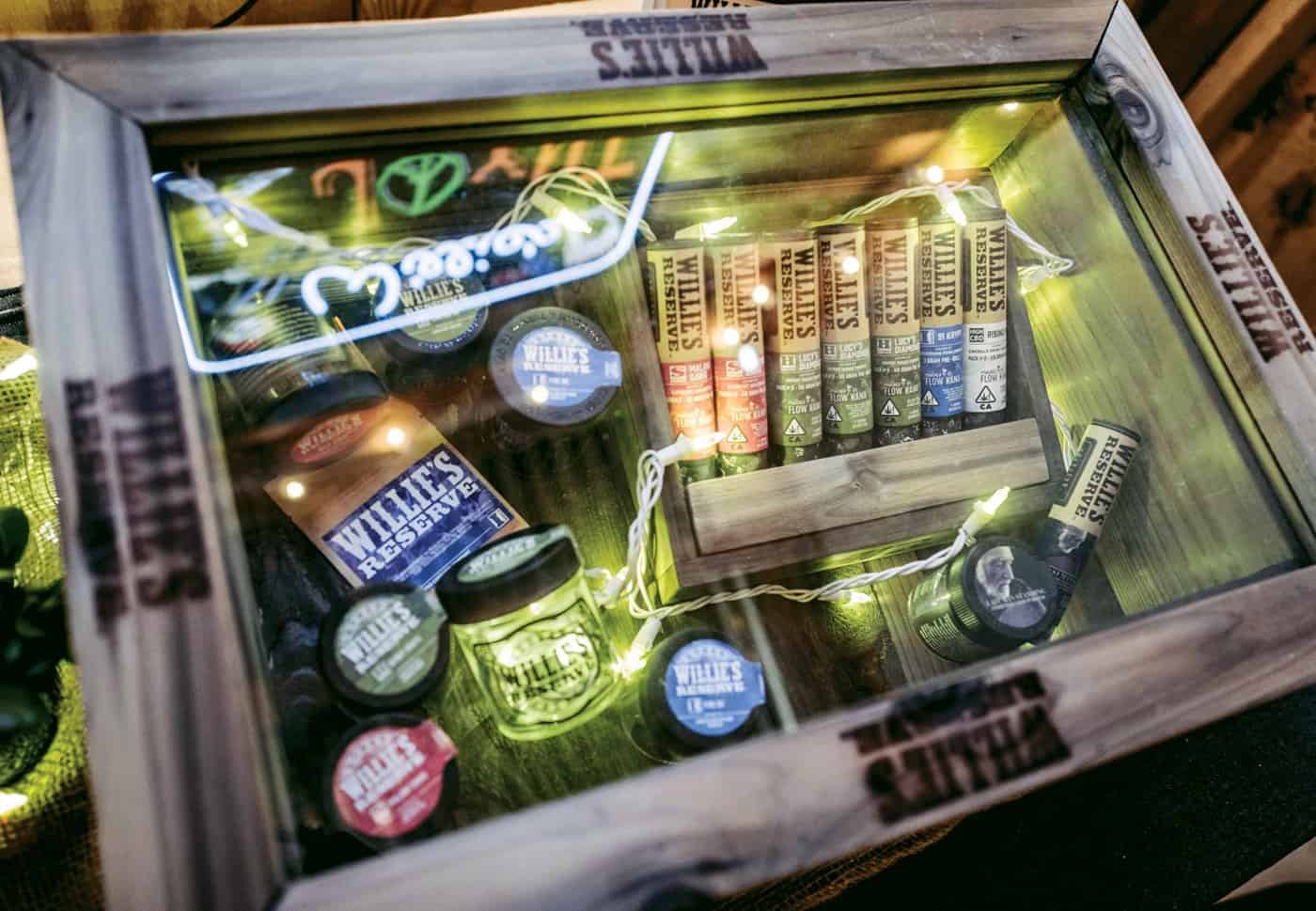
Baca himself is a new breed of celebrity—a cannabis celebrity, as the founding editor of The Denver Post’s supplement The Cannabist from 2013 to 2016. After The Cannabist, Baca founded Grasslands with a team of media professionals. The company represents many well-known industry brands including Willie’s Reserve, founded by legendary singer/songwriter Willie Nelson.
“Given that retail cannabis is still a relatively new marketplace, many consumers aren’t yet familiar with the brands and the flavors and the methods, which leaves the names [as “trusted sources”]: Willie Nelson, Martha Stewart, Snoop Dogg, Tommy Chong, Al Harrington, and other more cannabis-centric celebrities like Berner, Mr. Sherbinski, and Jane West. Familiar names can be a powerful gateway for a consumer, absolutely. That said, if the product doesn’t match the consumer’s expectations, they will go elsewhere,” Baca said.
Getting the Goop
Take Goop, for instance. More than one million people follow the Instagram account for the online wellness portal founded by actress Gwyneth Paltrow, while Paltrow’s personal Instagram profile is followed by 6.2 million people. In tweets and blog posts, Paltrow and her crew have suggested purchasing semi-precious gemstone eggs for women to amp up their Kegel exercises ($66) and detoxing with do-it-yourself coffee enema kits ($135).
In the 1990s, Paltrow won a Best Actress Oscar for her role in the film Shakespeare in Love, and she has authored several books. But she’s become a self-proclaimed maven of alternative lifestyle options, pushing boundaries and setting trends.
Founded in 2008 as a newsletter launched in Paltrow’s kitchen, Goop has become a go-to source for alternative wellness and lifestyle information with a loyal following of primarily female consumers who want info and recommendations about beauty, food, fashion, travel, wellness, work, and men. That’s a lot of lifestyle influence.
Paltrow doesn’t own or represent a cannabis product line yet, but that may be inevitable. Goop has featured cannabis and CBD products among other editorial content and even partnered with retail dispensary chain MedMen for a pop-up event at its Venice, California, store location.
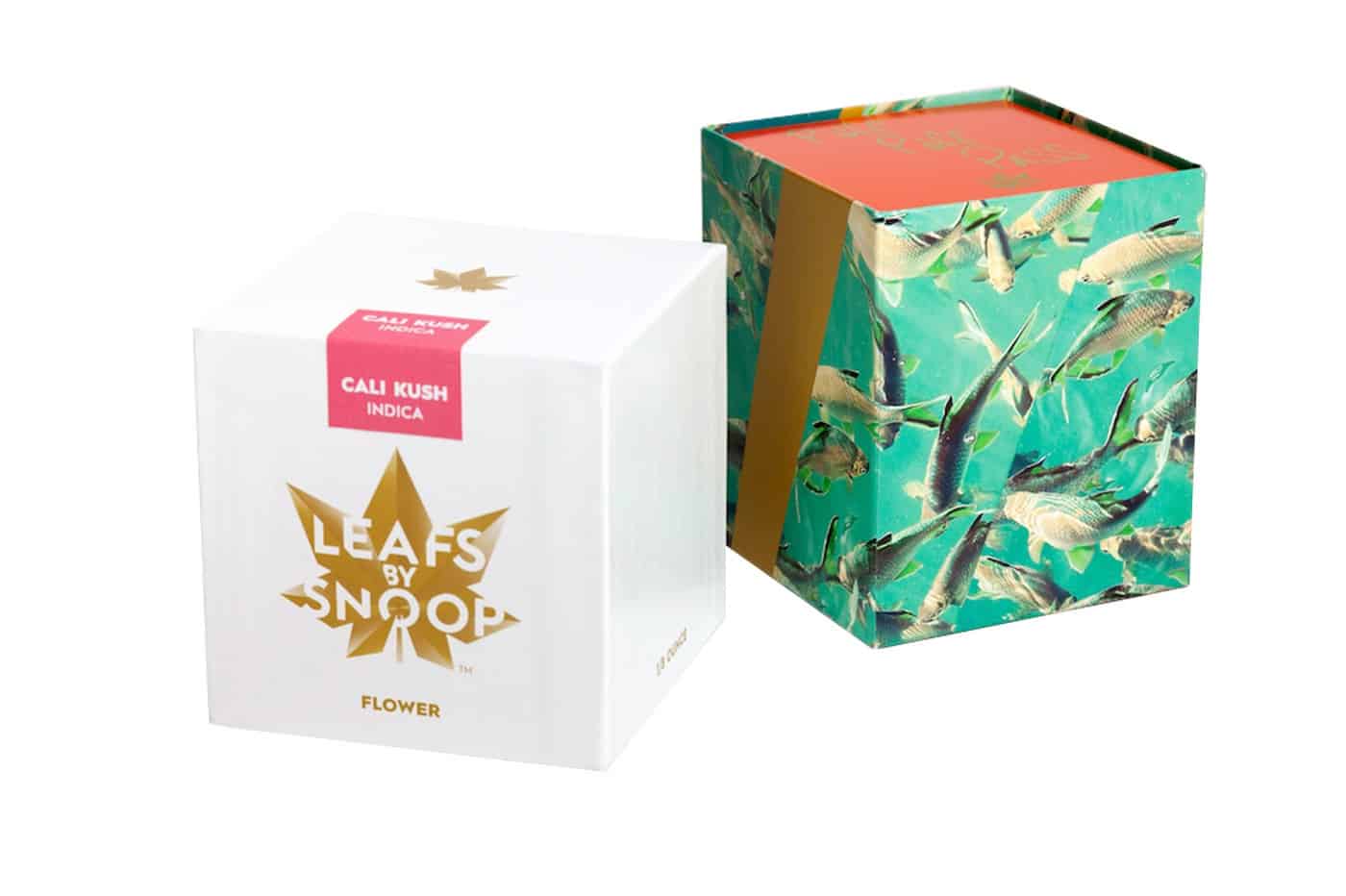 The mother of all lifestyle mavens, Martha Stewart, does have a cannabis-infused pet line in the works, in partnership with Canadian multinational Canopy Growth Corporation. Stewart’s reality TV show co-star and famous cannabis smoker, Snoop Dogg, reportedly encouraged the deal. His Leafs by Snoop line is also under the Canopy umbrella.
The mother of all lifestyle mavens, Martha Stewart, does have a cannabis-infused pet line in the works, in partnership with Canadian multinational Canopy Growth Corporation. Stewart’s reality TV show co-star and famous cannabis smoker, Snoop Dogg, reportedly encouraged the deal. His Leafs by Snoop line is also under the Canopy umbrella.
Stewart, who for decades has influenced lifestyle markets in everything from home décor to cooking and holiday entertaining, has the kind of clout that can move markets by introducing them to products they never knew they needed or even wanted. Her signature pet products line has been on shelves at Petsmart stores for years.
“Martha is already well known for her work in pet-health initiatives, and her wealth of experience is certainly of immense value when it comes to new product development in the CBD space,” said Canopy Growth Vice President of Communications and Media Jordan Sinclair. “The people we’ve collaborated with aren’t brand spokespeople, but rather partners of the company with their own brands and products that we stand behind.
“Seth [Rogen] and Snoop are both well known for their advocacy around cannabis use, so it probably wasn’t much of a surprise to anyone when they entered the cannabis space,” he added. “The knowledge and expertise they bring to the business as consumers themselves is likely reassuring to consumers who are interested in their products.”
Rogen, who starred in the television series Freaks and Geeks and comedy features like Superbad and Pineapple Express (the plot of which revolves around illicit marijuana), has hipster appeal when endorsing products and has appeared in ads for Budweiser and Samsung.
But, like Snoop and Stewart, Rogen is not just involved in an endorsement deal for a Canopy-branded product line; he is actually co-owner of cannabis company Houseplant and a newly minted cannabis entrepreneur in partnership with Canopy.
“For Canopy, it’s not about reaching out to specific demographics,” Sinclair pointed out. “Rather, we look to align with partners who share our drive for excellence and innovation.
“In Canada, cannabis consumables are set to become federally legal in October 2019,” he added. “This will include categories such as edibles and beverages, and formats like vape pens and infused oils.”
As Canada’s legal market expands to include more adult-use product categories, so will opportunities for business-minded personalities and promoters to gravitate to cannabis-infused markets, Sinclair speculated. Eventually, consumer and sales data will indicate which celebrities have a green touch.
“It will be interesting to see how those categories develop over time and the kind of interest we may see from people already working in related fields,” he said. “The potential for crossover collaborations is there, but at this stage we’re focused on development and production to meet the demand once the second wave of new products come to market.”
The impact of restrictive cannabis advertising regulations in Canada, and in most U.S. legal states, also promotes celebrity involvement with products intended for adult use. Until very recently, recreational use was prohibited in both countries.
In Canada, cannabis brands are not allowed packaging or advertising with any “depiction of a person, character, or animal, whether real or fictional.” Testimonials and endorsements likewise are not permitted. Canadian cannabis product manufacturers are allowed to use a distinct logo but not a signature color under the country’s “plain packaging” rules.
Beginning in November, tobacco products in Canada also must comply with plain packaging standards: plain, brown boxes emblazoned with nondescript logos and bright warnings, to include visual imagery of the effects of tobacco use, i.e. photos of patients suffering from terminal conditions like chronic obstructive pulmonary disease or cancer. Politicians and the Canadian public generally embrace more favorable opinions about cannabis. Where restrictions on advertising have been implemented, supporters say regulations prevent undue influence on those younger than age 21. Nevertheless, Rogen can’t promote his Houseplant brand with billboard images depicting him enjoying a bong. Because he co-owns the company, though, his endorsement is implied.
Rogen has nowhere near the brand-building power of a Kardashian, Jenner, or Justin Bieber, but he could—and probably will—wear a logoed T-shirt where paparazzi lurk. Every time a tabloid mentions he’s been blazing up with his boys or had to have his office fumigated to remove a certain telltale aroma represents another piece in the puzzle-like process of creating brand recognition.
“In our quest to build a globally recognizable brand on both medical and recreational fronts, we have two major priorities,” Sinclair said. “The first is ensuring the product we’re supplying is of the highest quality, and the second is creating a safe and trustworthy space for adult consumers to learn about legal cannabis and the various ways it can be integrated into their lives.
“With that in mind, we seek to partner with collaborators who share the same values—people who are at the top of their game and well known for the quality of their work,” he continued. “There are lots of individuals—including celebrities—we could potentially collaborate with, but when assessing partnerships, we choose to work with people based on their entrepreneurial drive and their passion for innovation, both in their own field and in the cannabis space.”
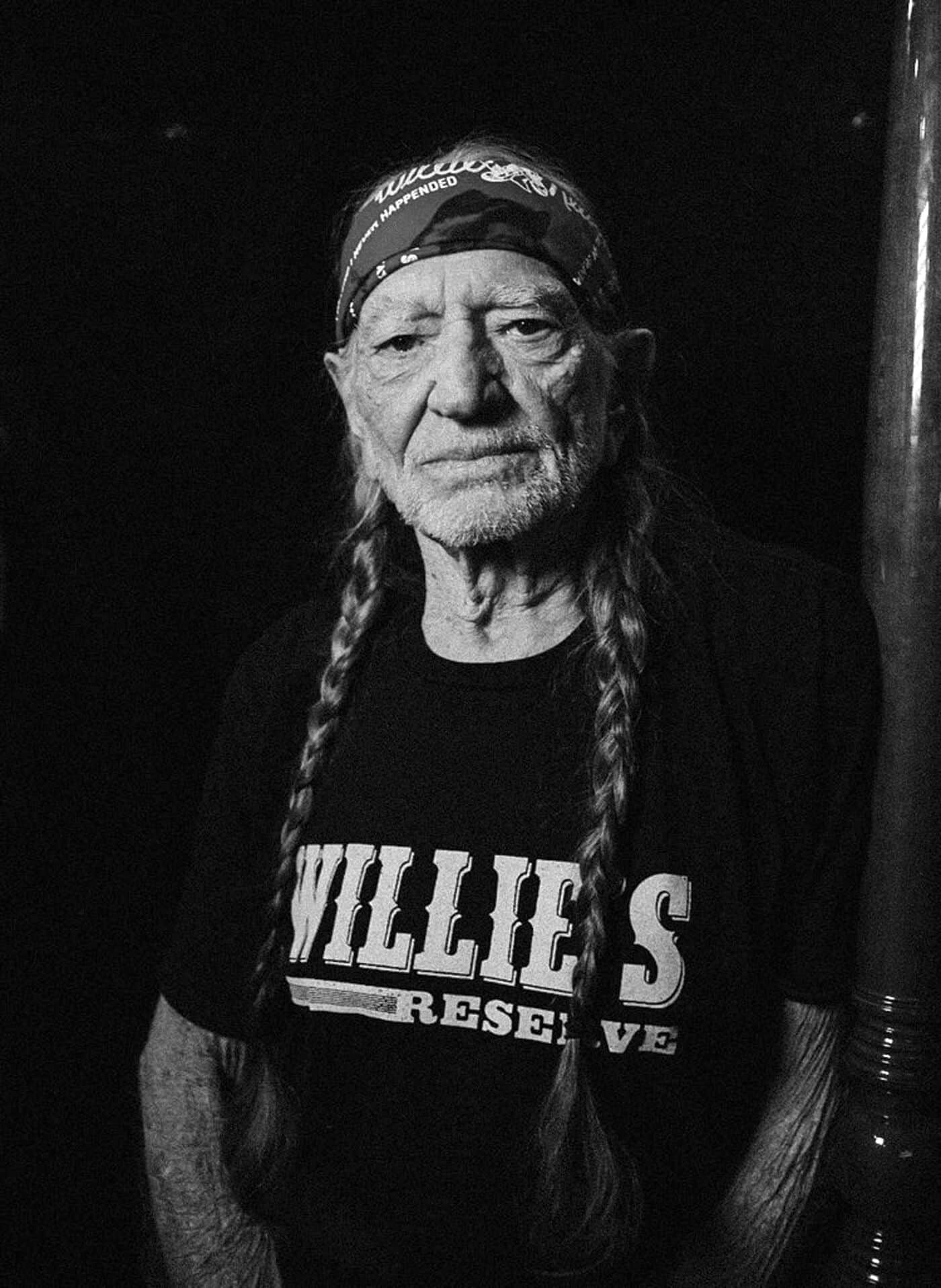 Déjà vu
Déjà vu
Some celebrity names immediately come to the forefront in cannabis discussions.
Calvin Broadus, better known as hip-hop artist Snoop Dogg, was early to the entrepreneurial game with his Leafs brand. Soon thereafter, he co-founded Casa Verde Capital, a cannabis-focused venture capital firm. The company’s portfolio includes e-commerce and delivery platform Eaze, the Merry Jane media platform, and wholesale marketplace Leaflink, among others.
Iconic American singer-songwriter-musician and activist Willie Nelson, at 87 years old, is the elder statesman of the industry. With a reputation for sharing his stash on tour and a pot-bust rap sheet, Nelson’s cannabis entrepreneurship was not unexpected. Willie’s Reserve and Willie’s Remedy are natural outgrowths of his personal brand.
David Crosby, another musician and activist with a notorious pot past, is preparing to launch Mighty Croz, an ultra-premium strain reportedly personally crafted by the co-founder of legendary bands The Byrds and Crosby, Stills, Nash, & Young. Crosby’s been busy: The 77-year-old’s biography, Remember My Name, dropped in July, and his most recent album, Here If you Listen, debuted last fall. In April, he began penning an advice column, “Ask Croz,” for Rolling Stone magazine. He was on the East Coast completing a twenty-three-stop tour when contacted for this story. All of those things keep his name in the public eye, and each one represents an opportunity for subtle brand promotion. Reportedly, Crosby and his longtime friend and business partner Steven Sponder seek a $5 million investment partnership.
“I was with David a few weeks ago, meeting with a leading cannabis gear manufacturing and distribution company,” Sponder said. “We’re cautiously deciding on the ideal company to partner with for the cannabis itself—one that will survive the inevitable industry consolidation. We’re focusing on developing a comprehensive line of Mighty Croz branded gear and accessories. We are focusing on launching with gear and accessories because that’s legal most everywhere, and we can get a presence quickly in most U.S. states as well as internationally.” Branded merch and apparel are bread-and-butter revenue for touring musicians, pro athletes, and other performers. “I can’t go into all the details, but for storage boxes, trays, etc., we are working with one of the world’s leading pearl inlay companies.”
Sponder also said cannabis is a product Crosby feels he can stand behind as a counterculture icon and cancer survivor who credits weed with his recovery, at least in part. “He enjoys being a part of something that makes people happy and helps them,” Sponder said. “He has said humans are always going to get high on something, which is why they started fermenting berries in the woods thousands of years ago. Of all the ways to get high, he believes cannabis is the least harmful—certainly less harmful than alcohol and opioids. He’s also passionate about decriminalization and feels it’s completely wrong for people to be incarcerated because of cannabis. We will support organizations that help those incarcerated because of cannabis.”
Despite a light entrepreneurial track record, Crosby could be a triple threat by cannabis standards with the right branding and promotion: He’s a cultural beacon for the Boomer demographic, his reputation is global, and he believes consumers perceive his credibility as authentic.
Unsurprisingly, he’s received feedback from others in the entertainment industry who also have active interests in cannabis, like comedian/talk show host Whoopi Goldberg (Whoopi & Maya) and singer/songwriter Melissa Etheridge (an infused wine called Know Label). “David’s music and entertainment-industry friends, including Whoopi Goldberg, have been very helpful to us by making introductions to cannabis companies they work with,” Sponder said. “His fans, as evidenced on social media, clearly want David Crosby-blessed cannabis. They see him as authentic and standing for quality. David has been a cannabis connoisseur for over fifty years. They get that he is not just someone famous using his name to jump on the cannabis bandwagon.”
Hollywood’s Elite
What’s in a name?
Tommy Chong: While some cannabis entrepreneurs avoid the stoner cliché, Tommy Chong can’t: He and his comedy partner at the time, Cheech Marin, practically invented the stereotype in the 1970s. The 1972 comedy album Big Bambù was a huge hit; the fold-out album came with a giant rolling paper tucked in the liner. The classic stoner film Up in Smoke cemented their legacy. In 2003, Chong was convicted of selling cannabis paraphernalia online and sentenced to nine months in prison and a $20,000 fine. Today, the 78-year-old is proprietor of Chong’s Choice.
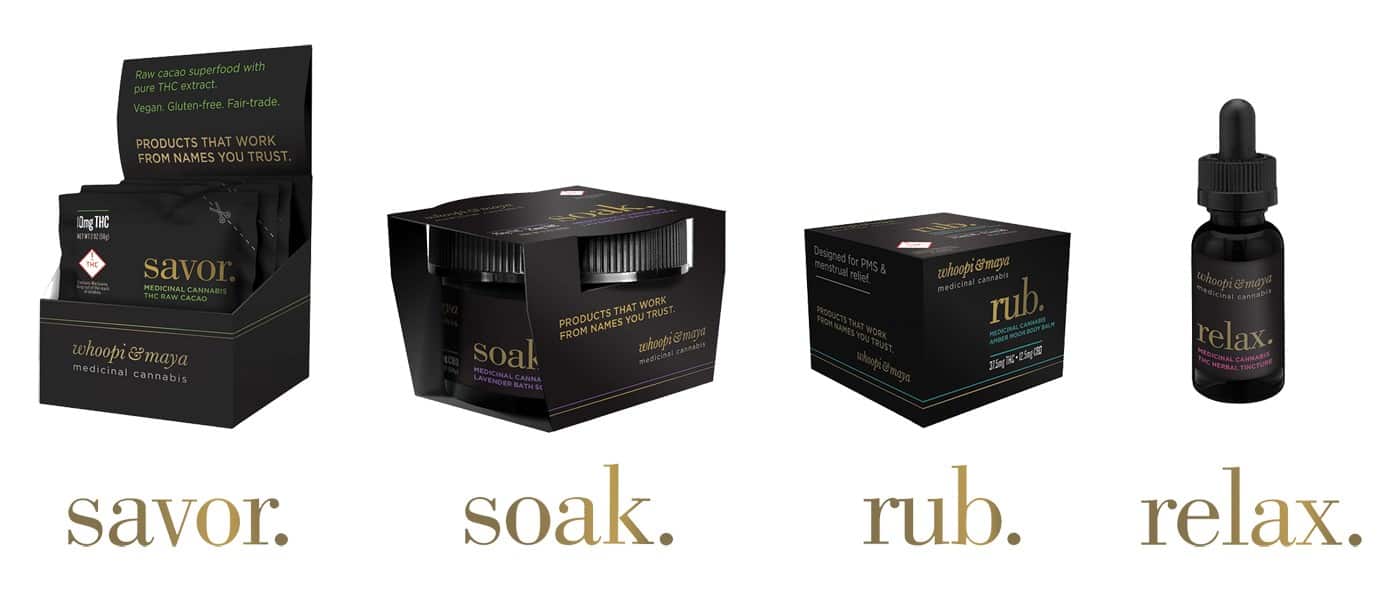
Whoopi Goldberg: A groundbreaking comedian, actress, and thought leader, Goldberg co-founded the brand Whoopi & Maya with Maya Elisabeth, the power behind award-winning Om Edibles. Goldberg’s authenticity and resonance with millions of women via her long-standing cohost role on TV talk show The View make her a branding natural.
Seth Rogen: In March, Canadian native and Hollywood multi-hyphenate Rogen launched his own cannabis brand, Houseplant. He’s the latest to join an impressive roster of celebrities who have partnered with Canadian cannabis multinationals like Canopy Growth. Rogen’s massive hipster appeal makes him a standard-bearer for Millennial males. He was even a fashion icon for a minute, pegged as a “scumbro” alongside Pete Davidson, Justin Bieber, and Shia LaBoeuf.
Sir Patrick Stewart: Star Trek’s Captain Jean-Luc Picard admitted to daily edible use to treat arthritis in 2017; in mid-2018 Stewart’s Oxford Cannabinoid Technologies announced a $10-million investment in partnership with Casa Verde Capital and British tobacco products giant Imperial Brands, whose cigarette labels include Winston and Kool. The cannabis research firm is actively funding cannabis research through a special program at Oxford University.
 Chelsea Handler: Another Hollywood multi-hyphenate, Handler is a vocal cannabis supporter, even confessing she’s used weed since her teen years, before California went med-legal and long before the state legalized recreational use. She plans a signature product line launch this fall, based around a strain she said will appeal to women: It doesn’t trigger the dreaded “munchies.”
Chelsea Handler: Another Hollywood multi-hyphenate, Handler is a vocal cannabis supporter, even confessing she’s used weed since her teen years, before California went med-legal and long before the state legalized recreational use. She plans a signature product line launch this fall, based around a strain she said will appeal to women: It doesn’t trigger the dreaded “munchies.”
There’s something for everyone out there. And as a woman I feel very passionately that we need to reeducate women on this cannabis world and destigmatize all of the labels that go with being a stoner. It’s not like that anymore. It’s much more medicinal. —Chelsea Handler, comedian
Kevin Smith: Famous for directing indie cult classic films like Clerks, Chasing Amy, Mall Rats, and Dogma, Smith is half of comedy duo Jay and Silent Bob. Having cultivated a character that rarely speaks, but smokes lots of weed, Smith may be the perfect pot representative for his signature brand Jay & Silent Bob’s Stash, produced by Canadian company Chemesis.
Musicians and Bands
Music and marijuana always have gone together like pancakes and syrup.
In the late 1930s, “reefer madness” was associated with fast living and hanging out with the “wrong crowd,” which included Mexicans, loose women, and jazz musicians. Prior to cannabis prohibition in 1937, jazz musicians including legendary trumpet master Louis “Satchmo” Armstrong and singer Cab Calloway talked and sang about cannabis. It’s not surprising contemporary musicians continue the legacy. A 2018 study found reggae (no surprise there), hip-hop, and electronic dance music audiences ingest the most cannabis.
The Marleys: Nearly deified for sharing his Rastafarian beliefs with the world, Bob Marley is an avatar for cannabis. The Marley family has continued his legacy: Son Damien is among the group of investors that owns High Times magazine; daughter Cedella is chief executive officer for the Bob Marley Group of Companies, which owns the Marley Natural brand; and son Stephen curates Kaya Fest, which every April 20 reunites the family musicians on stage.
Willie Nelson: County music legend and patron saint of Texas, Nelson is so deeply a part of weed culture a strain was named after him. Toby Keith and Scotty Emerick co-wrote and frequently perform a comedic ditty in homage to Nelson’s legendary pro-quality, not-so-secret stash: “I’ll Never Smoke Weed with Willie Again.” These days, Nelson is well-known for his brands Willie’s Reserve and Willie’s Remedy, which he and a band of cohorts reportedly dreamed up at Nelson’s kitchen table.
Jimmy Buffett: Serial entrepreneur and Parrothead in Chief Buffet launched the Coral Reefer line of cannabis products in sunny Florida, home of Margaritaville (another of his well-known brands). Under the Margaritaville brand alone, Buffett has interests in restaurants (in the U.S., Mexico, Caribbean, and soon Canada), food supply, footwear, rum, tequila, craft cocktails, tailgating, accessories, radio, and a Margaritaville Casino located in Biloxi, Mississippi. He lent another song title to his Cheeseburger in Paradise chain of burger restaurants, located in the Midwest and eastern states. Don’t forget the licensing deal with Anheuser Busch, for Landshark Lager. For Coral Reefer cannabis, named after his band, Buffett partnered with Florida-based Surterra.
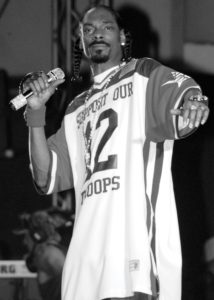 Snoop Dogg: Dogg is one of the rare breed who transcended the quasi-legal and built a bridge to mainstream consumers. That intangible quality is marketing lightning in a bottle. Like Nelson and fellow rapper B-Real, it’s hard not to associate Dogg with cannabis. His brand has expanded to include VH1 lifestyle cooking show Martha [Stewart] and Snoop’s Potluck Dinner Party, a subsequent cookbook, and forays into fashion. For Leafs by Snoop, he partnered with Canadian multinational Canopy Growth. Dogg co-founded Casa Verde Capital, which has invested millions into cannabis projects and products backed by other celebrities including Martha Stewart and British actor Sir Patrick Stewart.
Snoop Dogg: Dogg is one of the rare breed who transcended the quasi-legal and built a bridge to mainstream consumers. That intangible quality is marketing lightning in a bottle. Like Nelson and fellow rapper B-Real, it’s hard not to associate Dogg with cannabis. His brand has expanded to include VH1 lifestyle cooking show Martha [Stewart] and Snoop’s Potluck Dinner Party, a subsequent cookbook, and forays into fashion. For Leafs by Snoop, he partnered with Canadian multinational Canopy Growth. Dogg co-founded Casa Verde Capital, which has invested millions into cannabis projects and products backed by other celebrities including Martha Stewart and British actor Sir Patrick Stewart.
B-Real: The original Dr. Greenthumbs, B-Real’s Eastside Los Angeles style of rap and rhymes earned him a loyal fan following who now can visit his dispensary (named Dr. Greenthumbs, naturally) in Sylmar, California. B-Real may have anticipated some of the challenges with Proposition 64, because initially he was against the legislation that allowed recreational use. He and bandmatesmin Cypress Hill partnered with Bhang Corporation
to create Cypress Hill Bhang, which launched in 2018 in tandem with the group’s studio album Elephants on Acid.
Wiz Khalifa: Rapper Khalifa partnered with Supreme Cannabis Company for his KKE brand products and premium signature strain Khalifa Kush. The strain’s Instagram stream is a testament to the rapper’s love of cannabis and the luxe lifestyle.
Berner: Khalifa influenced Bay Area rapper Berner both in hip-hop and cannabis. An industry veteran and advocate, Berner took his Cookies brand to Southern California with a flagship shop and cultivation facility located in Maywood and a boutique-style dispensary on
tony international shopping hotspot Melrose Avenue in West Hollywood.
Kurupt: Rapper/actor Kurupt and brand partner Dr. Zodiac brought the world Moon Rocks, a potent concoction of dried flower dipped in honey oil and then rolled in kief. Kurupt’s moniker is prominently emblazoned on packaging for marketing effect.
Shavo Odajian: Bassist with metal band System of a Down, Odajian has become a hardcore cannabis entrepreneur with his L.A.-based brand 22Red. At the recent launch of the line’s latest specialty strains, Odajian appeared for a meet-and-greet at MMD-Hollywood dispensary, around the corner from the legendary Amoeba record store. “It’s what I smoke, so, if you’re looking for high-quality, tasty cannabis—high quality THC and CBD—you’re not going to get anything less,” he said at the event.
Gene Simmons: Not only is KISS frontman and co-founder Simmons a bona fide rock-and-roll legend, he’s also an enthusiastic entrepreneur and capitalist who virtually invented, and certainly capitalized on, genre merchandising. His credits include reality TV star, author, and sought-after business speaker. Though the Rock N Roll Hall of Fame member famously claimed he has never used drugs (unlike most other performers of the era), he’s definitely not one to pass up a good opportunity. His line of Gene Simmons’ CBD-infused MoneyBag™ Sodas launched in April.
The Tragically Hip: Canadian Music Hall of Fame rockers and beloved house band sometimes referred to as just The Hip back the Up Cannabis brand. Partnered with Canadian chain Spiritleaf Inc., the band sponsors a series of pop-up shops inside select Spiritleaf locations. Strains offered by Up Cannabis are named for The Tragically Hip songs.
Other cannabis rock stars and band brands: Rappers in the game include The Game, almost all the members of Wu Tang Clan, Jay-Z, Lil’ Pump, Migos, Rick Ross, Jim Jones, 2Chainz, Chief Keef, Soulja Boy, Ty Dolla Sign, Dizzy Wright, Lil Debbie, Rico Nasty… The list is long, distinguished, and grows daily. More music industry cannabis transplants include Orange County surf rockers Sublime, Rilo Kiley’s Jenny Lewis, South African zef rap duo Die Antwoord, and Colorado-based Big Gigantic and Trev Rich, among others.
Pro Sports
In the game but no longer playing.
Mike Tyson: The champ is building his own cannabis dude ranch destination in Desert Hot Springs, California. Once completed, Tyson and team envision Tyson Ranch will include an entertainment center and “glamping” as well as cannabis research, production, and education facilities. In February, Tyson Ranch hosted the inaugural Kind Music Fest, which the legendary heavyweight hopes will grow into an annual cannabis-infused, hip-hop happening. Tyson Ranch flower, extracts, and edibles are available in California and Las Vegas.
 Al Harrington: Upon retiring after sixteen seasons with seven NBA teams, Harrington founded Viola Extracts, named for his grandmother who found cannabis significantly relieved symptoms of glaucoma and diabetes. The company cultivates its own weed and manufactures products in-house in seven states. In February 2018, he launched the CBD brand Harrington Wellness and invested in edibles maker Butter Baby. The three companies together form The Harrington Group.
Al Harrington: Upon retiring after sixteen seasons with seven NBA teams, Harrington founded Viola Extracts, named for his grandmother who found cannabis significantly relieved symptoms of glaucoma and diabetes. The company cultivates its own weed and manufactures products in-house in seven states. In February 2018, he launched the CBD brand Harrington Wellness and invested in edibles maker Butter Baby. The three companies together form The Harrington Group.
Ricky Williams: Williams launched a line of cannabis-infused botanical products, Real Wellness, in 2018. The NFL disciplined the former Miami Dolphins and New Orleans Saints running back several times for cannabis use. Real Wellness offers THC- and CBD-infused topicals, tinctures, and vape cartridges.
Joe Montana: A Hall of Famer and former quarterback for the San Francisco 49ers and Kansas City Chiefs, “Joe Cool” invested $75 million in California producer Caliva in January. In 2014, Montana invested more than $4 million in online portal Herb.co.
Cliff Robinson: In 2017, the former Portland Trailblazer known as Uncle Cliffy introduced his eponymous brand in—where else?—Portland, Oregon. A passionate cannabis advocate while in the NBA, Robinson said he used cannabis to help with anxiety and injuries over his eighteen-year career. The baller partnered with Pistil Point Cannabis to bring his line to life.
Ross Rebagliati: Canadian Olympic snowboarder Rebagliati became a cannabis standard-bearer after being stripped of his gold medal when a post-competition blood test detected THC in his system. He regained the medal on appeal. In retirement, he founded medical cannabis brand Ross’ Gold, which operated in the U.S. and Canada, and the CBD company Legacy Brands. He’s an outspoken advocate for medical use by professional athletes.











